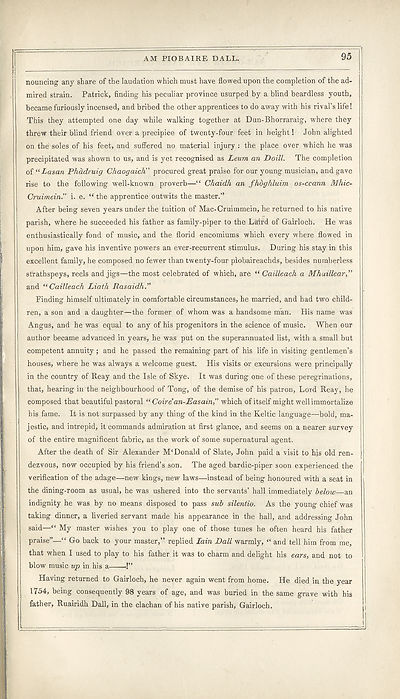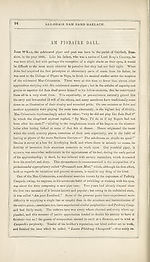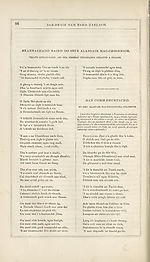Books and other items printed in Gaelic from 1871 to 1900 > Sar-obair nam bard Gaelach, or, The beauties of Gaelic poetry, and lives of the Highland bards
(175) Page 95
Download files
Complete book:
Individual page:
Thumbnail gallery: Grid view | List view

AM PIOBAIRE CALL.
95
nouncing any share of the laudation which must have flowed upon the completion of the ad¬
mired strain. Patrick, finding his peculiar province usurped by a blind beardless youth,
became furiously incensed, and bribed the other apprentices to do away with his rival’s life!
This they attempted one day while walking together at Dun-Bhorraraig, where they
threw their blind friend over a precipice of twenty-four feet in height! John alighted
on the soles of his feet, and suffered no material injury : the place over which he was
precipitated was shown to us, and is yet recognised as Leum an Doill. The completion
of “Lasan Phadruig Chaogaich" procured great praise for our young musician, and gave
rise to the following well-known proverb—“ Chaiclh an fhdghluim os-ccann Mhic-
Cruimein” i. e. “ the apprentice outwits the master.”
After being seven years under the tuition of Mac-Cruimmein, he returned to his native
parish, where he succeeded his father as family-piper to the Laird of Gairloch. He was
enthusiastically fond of music, and the florid encomiums which every where flowed in
upon him, gave his inventive powers an ever-recurrent stimulus. During his stay in this
excellent family, he composed no fewer than twenty-four piobaireachds, besides numberless
strathspeys, reels and jigs—the most celebrated of which, are “ Cailleach a Mhuillear”
and “Cailleach Liath liasaidh.”
Finding himself ultimately in comfortable circumstances, he married, and had two child¬
ren, a son and a daughter—the former of whom was a handsome man. His name was
Angus, and he was equal to any of his progenitors in the science of music. When our
author became advanced in years, he was put on the superannuated list, with a small but
competent annuity ; and he passed the remaining part of his life in visiting gentlemen’s
houses, where he was always a welcome guest. His visits or excursions were principally
in the country of Reay and the Isle of Skye. It was during one of these peregrinations,
that, hearing in the neighbourhood of Tong, of the demise of his patron. Lord Rea}', he
composed that beautiful pastoral “ Coire’an-Easain,” which of itself might well immortalize
his fame. It is not surpassed by any thing of the kind in the Keltic language—bold, ma¬
jestic, and intrepid, it commands admiration at first glance, and seems on a nearer survey
of the entire magnificent fabric, as the work of some supernatural agent.
After the death of Sir Alexander M'Donald of Slate, John paid a visit to his old ren¬
dezvous, now occupied by his friend’s son. The aged bardic-piper soon experienced the
verification of the adage—new kings, new laws—instead of being honoured with a seat in
the dining-room as usual, he was ushered into the servants’ hall immediately below—an
indignity he was by no means disposed to pass sub silentio. As the young chief was
taking dinner, a liveried servant made his appearance in the hall, and addressing John
said—“ My master wishes you to play one of those tunes he often heard his father
praise”—“ Go back to your master,” replied Iain Dali warmly, “ and tell him from me,
that when I used to play to his father it was to charm and delight his ears, and not to
blow music up in his a !”
Having returned to Gairloch, he never again went from home. He died in the year
1754, being consequently 98 years of age, and was buried in the same grave with his
father, Ruairidh Dali, in the clachan of his native parish, Gairloch.
95
nouncing any share of the laudation which must have flowed upon the completion of the ad¬
mired strain. Patrick, finding his peculiar province usurped by a blind beardless youth,
became furiously incensed, and bribed the other apprentices to do away with his rival’s life!
This they attempted one day while walking together at Dun-Bhorraraig, where they
threw their blind friend over a precipice of twenty-four feet in height! John alighted
on the soles of his feet, and suffered no material injury : the place over which he was
precipitated was shown to us, and is yet recognised as Leum an Doill. The completion
of “Lasan Phadruig Chaogaich" procured great praise for our young musician, and gave
rise to the following well-known proverb—“ Chaiclh an fhdghluim os-ccann Mhic-
Cruimein” i. e. “ the apprentice outwits the master.”
After being seven years under the tuition of Mac-Cruimmein, he returned to his native
parish, where he succeeded his father as family-piper to the Laird of Gairloch. He was
enthusiastically fond of music, and the florid encomiums which every where flowed in
upon him, gave his inventive powers an ever-recurrent stimulus. During his stay in this
excellent family, he composed no fewer than twenty-four piobaireachds, besides numberless
strathspeys, reels and jigs—the most celebrated of which, are “ Cailleach a Mhuillear”
and “Cailleach Liath liasaidh.”
Finding himself ultimately in comfortable circumstances, he married, and had two child¬
ren, a son and a daughter—the former of whom was a handsome man. His name was
Angus, and he was equal to any of his progenitors in the science of music. When our
author became advanced in years, he was put on the superannuated list, with a small but
competent annuity ; and he passed the remaining part of his life in visiting gentlemen’s
houses, where he was always a welcome guest. His visits or excursions were principally
in the country of Reay and the Isle of Skye. It was during one of these peregrinations,
that, hearing in the neighbourhood of Tong, of the demise of his patron. Lord Rea}', he
composed that beautiful pastoral “ Coire’an-Easain,” which of itself might well immortalize
his fame. It is not surpassed by any thing of the kind in the Keltic language—bold, ma¬
jestic, and intrepid, it commands admiration at first glance, and seems on a nearer survey
of the entire magnificent fabric, as the work of some supernatural agent.
After the death of Sir Alexander M'Donald of Slate, John paid a visit to his old ren¬
dezvous, now occupied by his friend’s son. The aged bardic-piper soon experienced the
verification of the adage—new kings, new laws—instead of being honoured with a seat in
the dining-room as usual, he was ushered into the servants’ hall immediately below—an
indignity he was by no means disposed to pass sub silentio. As the young chief was
taking dinner, a liveried servant made his appearance in the hall, and addressing John
said—“ My master wishes you to play one of those tunes he often heard his father
praise”—“ Go back to your master,” replied Iain Dali warmly, “ and tell him from me,
that when I used to play to his father it was to charm and delight his ears, and not to
blow music up in his a !”
Having returned to Gairloch, he never again went from home. He died in the year
1754, being consequently 98 years of age, and was buried in the same grave with his
father, Ruairidh Dali, in the clachan of his native parish, Gairloch.
Set display mode to: Large image | Transcription
Images and transcriptions on this page, including medium image downloads, may be used under the Creative Commons Attribution 4.0 International Licence unless otherwise stated. ![]()
| Permanent URL | https://digital.nls.uk/109811173 |
|---|
| Description | Out-of-copyright books printed in Gaelic between 1631 and 1900. Also some pamphlets and chapbooks. Includes poetry and songs, religious books such as catechisms and hymns, and different editions of the Bible and the Psalms. Also includes the second book ever published in Gaelic in 1631. |
|---|

